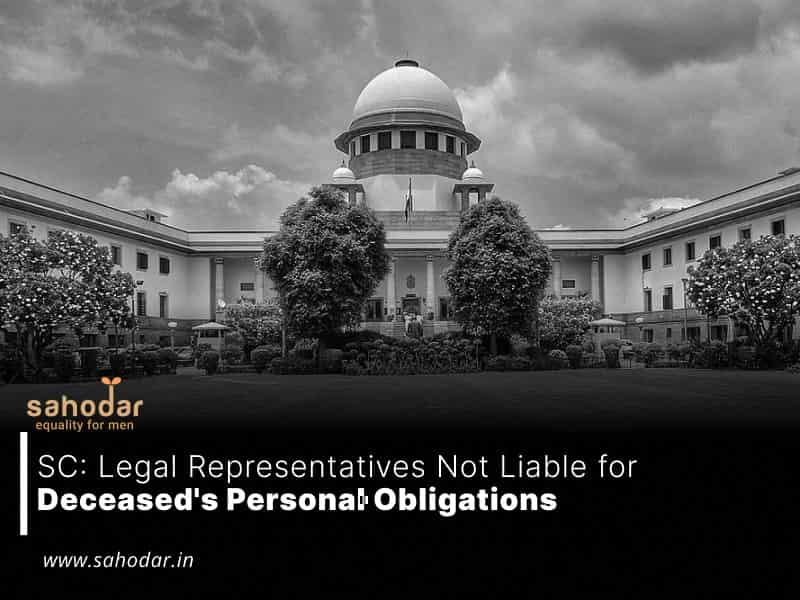The Supreme Court has decreed, in a consolidated array of appeals presented by the legal successors of a sole proprietor, that the said representatives bear no obligation to discharge liabilities that were incumbent upon the deceased individual solely in their personal capacity. This pronouncement diverges from the prevailing final judgment rendered by the National Consumer Disputes Redressal Commission (NCDRC).
The two-Judge Bench comprising Justice B.V. Nagarathna and Justice Ujjal Bhuyan said, “… we hold that the legal representatives of the deceased opposite party-appellants herein are not liable to discharge the obligation which had to be discharged by the deceased opposite party in his personal capacity and hence that portion of the impugned orders of the NCDRC, State Commission and District Forum are set aside. Needless to observe that the direction for payments shall be made by the legal representatives from the estate of the deceased opposite party if not already satisfied.”
The Bench remarked that when a contractual obligation is of a personal nature and is incumbent upon an individual, upon their demise, their estate does not inherit such obligations. Consequently, the legal representatives, who act on behalf of the deceased’s estate, cannot be compelled to assume or discharge the contractual obligations of the deceased.
Advocate Aniruddha Deshmukh appeared on behalf of the appellants, while Advocate Abhishek Yadav represented the respondents.
In the present case, the appellants, as the legal heirs of the original opposing party in the consumer complaint before the District Forum, were arrayed against the respondents, who acted as the complainants. The crux of the dispute arose from a Development Agreement executed between the complainants and the opposing party, wherein the former were entitled to obtain eight residential flats and a consideration of Rs. 6,50,000/-. Allegations were leveled by the complainants concerning breaches of the agreement, including deviations from sanctioned plans, non-construction of a compound wall affecting parking, access issues, and unauthorized constructions beyond sanctioned plans, subsequently divested to third parties.
Additionally, deficiencies in the building construction, such as structural cracks, incomplete terrace work, and the absence of provisions for electricity meters, were brought to light. Despite notices served by the complainants, the opposing party refuted the allegations, contending that the complainants owed them Rs. 8,60,000/- for construction and amenities. Consequently, a complaint was lodged before the District Consumer Forum, and ensuing appeals were made to the State Commission. The State Commission, while partially amending the order by dismissing certain claims as time-barred, upheld the directive to pay Rs. 1.5 lakhs. Subsequently, a revision petition ensued, and the National Consumer Disputes Redressal Commission (NCDRC) affirmed the order to pay Rs. 1.65 lakhs and Rs. 1.85 lakhs, alongside accrued interest.
The Supreme Court in view of the above facts noted, “The question is: what would happen to the obligations imposed personally on the original opposite party on his demise? No doubt, the estate of the original opposite party would be liable for any monetary decree or directions for payment issued in the present case. However, what about the obligations which had to be performed under the Development Agreement such as certain construction to be made and certain approvals etc. to be obtained by him on completion of the construction. Can the legal representatives be liable to comply with those obligations under the Development Agreement on the demise of the original opposite party?”
The Court additionally emphasized that in instances where a decree or order does not hold the estate of a deceased sole proprietor liable, but rather pertains to the individual skills and expertise of the sole proprietor, the obligations inherent to the proprietor’s role cease upon their demise. As such, such obligations cannot be transferred or imposed upon their legal heirs or representatives.
Top of Form
… in the case of sole proprietorship, which is a common form of business in India, when a legal obligation arises under a contract which has to be discharged personally by the sole proprietor, who is since deceased, had entered into the agreement, such as, in the case of a Development Agreement in the instant case, can such obligations be imposed on his legal representatives or heirs who are not parties to the Development Agreement and where the obligations under such an agreement per se cannot be fulfilled inasmuch as they neither have the skills nor the expertise to do so and those obligations depend purely on the skills and expertise of the deceased sole proprietor?”, it also asked.
The Court observed that a proprietorship firm does not possess distinct legal personality distinct from its proprietor. Consequently, upon the demise of the proprietor, their estate assumes liability solely for the satisfaction of a decree or order in monetary terms. Furthermore, the Court elucidated that if the estate of the deceased becomes liable, then the legal representatives, who legally represent the estate of the deceased individual, or any person who interferes with the estate of the deceased, and in cases where a party litigates in a representative capacity, the individual upon whom the estate devolves upon the death of the litigating party becomes liable to the extent to which the estate has devolved.
“… what is crucial is that the estate of a deceased person which becomes liable and the legal representatives must discharge their liability to a decree holder or a person who has been granted an order to recover from the estate of the deceased which they would represent and not beyond it”, it added.
The Court concluded that any decree pertaining to the extent of the deceased’s property, which has been inherited by the legal representatives and remains undistributed, shall be subject to execution by a decree holder to compel the legal representatives to satisfy the decree. It observed that even a decree for preventive injunction may be enforced against the legal representatives of the deceased judgment-debtor, provided such decree relates to the property or is inseparable from it, particularly in instances where a threat emanates from said legal representatives.
Accordingly, the Supreme Court granted the appeals.

